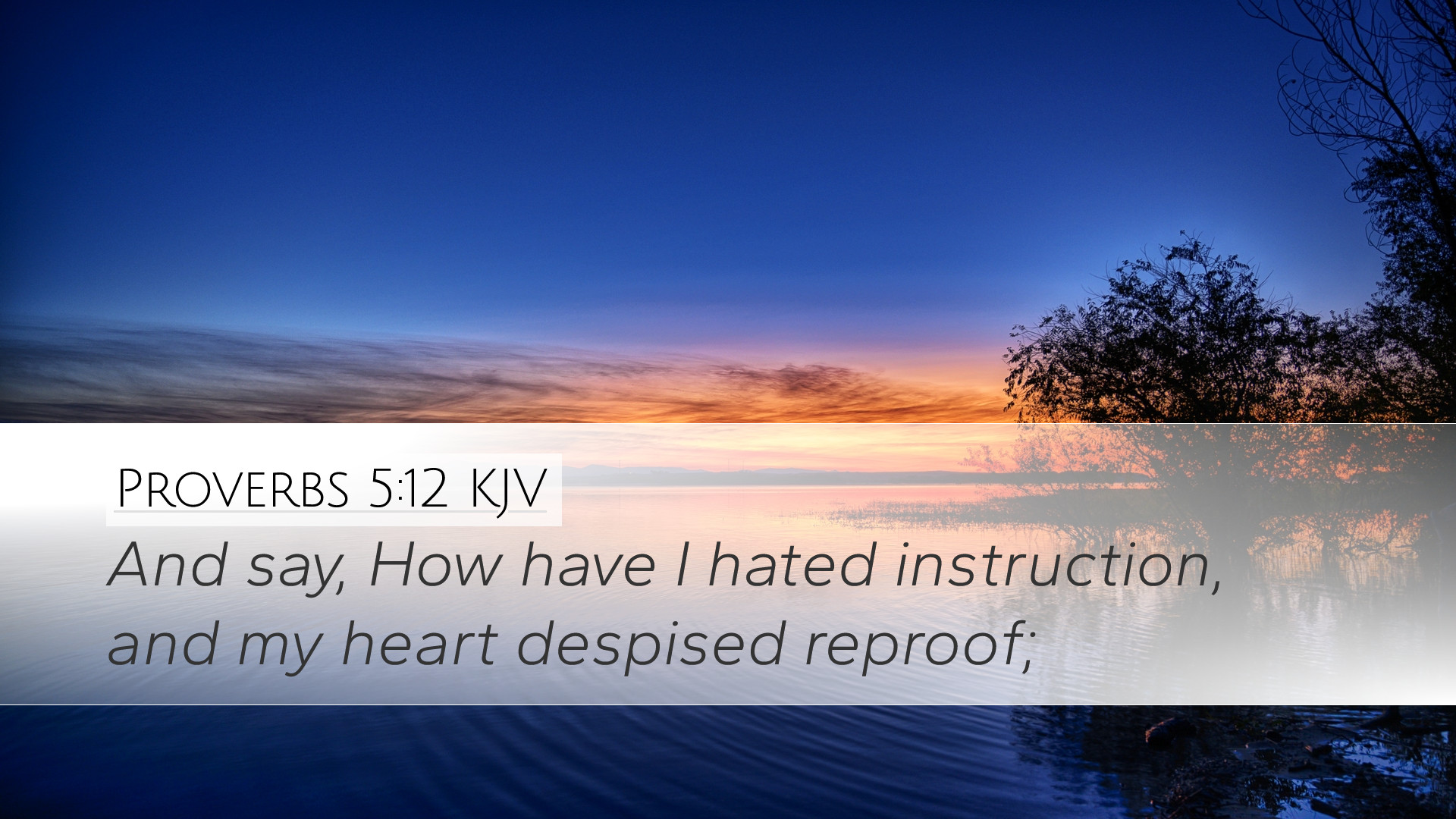Commentary on Proverbs 5:12
Verse Text: "And say, How have I hated instruction, and my heart despised reproof!"
Introduction
The verse from Proverbs 5:12 serves as a powerful reflection on the human tendency to reject wisdom and correction. In this commentary, we shall delve into the insights provided by renowned biblical commentators including Matthew Henry, Albert Barnes, and Adam Clarke, exploring the profound implications this verse holds for individuals seeking moral and spiritual guidance.
Contextual Background
This verse is situated within a passage that warns against adultery and the dangers of moral laxity. The author, traditionally considered to be Solomon, aims to provide practical wisdom for life, particularly concerning the seductive allure of immorality. Understanding the surrounding verses enhances the gravity of the warning being given.
Insights from Matthew Henry
Overview: Matthew Henry, in his classic commentary, emphasizes the misconception that wisdom and instruction lead to limitations and constraints on freedom. He notes how the rejection of admonition is a precursor to folly.
- Hate for Instruction: Henry illuminates the irony of human nature, where one might detest the very guidance meant for their benefit. The disdain for instruction often stems from pride, leading individuals to overlook their need for correction.
- Culmination of Reproof: The phrase "my heart despised reproof" highlights a deeper emotional response, where rejection becomes a heart issue. Henry argues that true wisdom is accompanied by an openness to correction.
- Consequences of Rejection: He warns that those who despise instruction often find themselves trapped in destructive patterns, unable to grasp the intended purpose of divine guidance.
Insights from Albert Barnes
Overview: Albert Barnes contributes a critical interpretation that underlines the importance of heeding wise counsel. He frames this verse as an introspective moment, prompting the readers to assess their responses to wisdom.
- Self-Examination: Barnes encourages believers to ask themselves whether they have become resistant to correction. His commentary urges a reflective posture that invites one to re-evaluate their attitudes toward instruction.
- Value of Admonition: He stresses the pivotal role of reproof in spiritual and moral growth. Ignoring reproof translates to missed opportunities for maturity and understanding.
- Regret and Awareness: Barnes asserts that recognition of one’s disregard for instruction can lead to regret. This verse captures a moment of realization that highlights the importance of living wisely.
Insights from Adam Clarke
Overview: Adam Clarke provides a detailed insight into the text, focusing on the psychological and spiritual aspects of rejecting instruction. His comments emphasize personal responsibility in the pursuit of wisdom.
- Mechanism of Rejection: Clarke observes that rejection of guidance often manifests through excuses or rationalizations. Individuals might convince themselves that their path, however misguided, is legitimate.
- Spiritual Implications: He notes that calling out for wisdom while simultaneously spurning it reveals a contradiction inherent in human nature, emphasizing the need for authenticity in one’s spiritual journey.
- Call to Action: Clarke's commentary shifts toward practical application—teaching that a penitent heart must be willing to seek out and embrace correction, making it an integral part of one’s faith journey.
Theological Reflections
Collectively, these commentaries highlight a comprehensive theological understanding of Proverbs 5:12. The rejection of wisdom can lead to moral downfall, spiritual stagnation, and ultimately regret. Here are some theological reflections derived from the commentaries:
- Humility vs. Pride: Each commentator touches on the necessity of humility in the face of instruction. The proud heart that rejects correction will inevitably falter.
- The Role of the Holy Spirit: The work of the Holy Spirit is integral, as believers are called to be sensitized to divine correction in their lives.
- Community and Accountability: The value of community in providing correction is underscored—a reminder that wisdom thrives within a context of accountability.
Conclusion
Proverbs 5:12 serves as a sobering reminder of the importance of instruction and the dangers that accompany its rejection. Pastors, students, theologians, and scholars alike will benefit from the insights gleaned from Henry, Barnes, and Clarke, recognizing that the path of wisdom requires an intentional openness to correction and a commitment to growth.
As we reflect on this verse, let us consider our response to divine guidance, striving to cherish and embrace reproof, so that we may walk in the ways of wisdom and righteousness.


